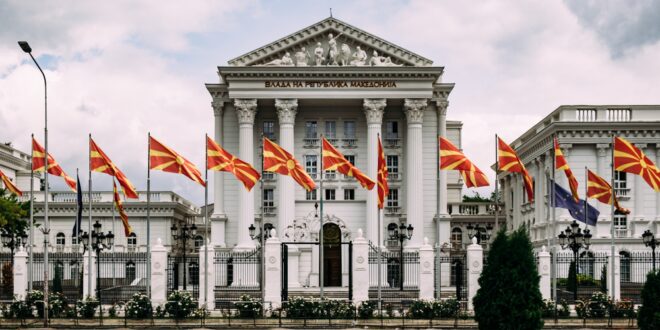After the overwhelming victory in the political and presidential elections last May 8, VMRO DPMNE and its new allies are starting to outline the priorities of the new government. The future of the country’s European integration, also linked to difficult constitutional reforms, remains a puzzle with a difficult solution
After May’s election in North Macedonia, VMRO DPMNE took power from SDSM after seven years in opposition. In the parliamentary elections, it won 58 out of 120 MPs, while the two coalitions around the former ruling parties SDSM and DUI won 18 each. The “Vredi” coalition has 14, while the ZNAM and Levica parties have six each in the new parliament.
During the electoral campaign and after winning the election, VMRO DPMNE made three commitments: the pursue of European integration, the fight against crime and corruption, and strong economic growth.
The integration process was a challenge for the previous government led by SDSM – which lacked the 81 out of 120 MPs required to pass the reform – after the EU asked North Macedonia to include in its Constitution the Bulgarian minority, which according to the 2021 census amounts today to around 3000 people.
VMRO DPMNE has made an agreement with the coalition “Vredi” – including the parties representing the Albanian community – and the movement ZNAM: the new majority can currently count on 78 MPs, and it may or may not receive support from the now opposition SDSM and DUI to implement the constitutional amendments.
During its campaign, VMRO DPMNE promised to do so, but only when the country becomes a member of the EU, or with the support of major powers-states and signs of goodwill from Bulgaria and a clear agreement that Sofia will pose no additional vetoes to Skopje’s European integration bid.
Before the elections, SDSM assured that so far Bulgaria has not accepted any delayed validity of the constitutional amendments and this approach has been supported by all EU member states: so the party – now the major opposition force in parliament – believes that VMRO-DPMNE will only waste its time trying to push for such a solution.
In the meantime, a new speaker has been elected in the Parliament: Afrim Gashi, ethnic Albanian from the “Vredi” coalition, supported by 76 MPs.
“I believe that if we know and want it, we have many points that unite us. This is a good opportunity to cooperate, and we have few things that divide us and it is an opportunity be tolerant and respect the right to democracy”, he stated after being elected.
VMRO DPMNE defeated SDSM in the presidential elections as well. For the first time, a woman was elected president – Gordana Siljanovska-Davkova won 65.14% of the votes, while the previous head of state Stevo Pendarovski received 29.25%.
On May 12, when she took the oath in the Parliament, she referred to the country as “Macedonia”, avoiding to use the official name of “Republic of North Macedonia”. This caused strong reactions especially from Greece, but also from other European countries. The president and the state were reprimanded for not following the Prespa Agreement reached with Greece in 2018 and the Good Neighbor Agreement with Bulgaria from 2017.
President Gordana Siljanovska Davkova then announced that she would adhere to the official application of the constitutional name. The cabinet pointed out that the solemn oath was signed using the constitutional name Republic of North Macedonia.
“In her public appearances, the Macedonian president has the right to use the name Macedonia, as an act of personal right to self-determination and self-identification, respecting basic human rights and freedoms, and in accordance with European values and principles”, emphasised the cabinet. “In the last five years, Macedonian institutions have almost completely fulfilled their obligations from the Prespa Agreement, and the president expects all Macedonian partners to respect the bilateral and multilateral obligations they have undertaken towards the country”.
As regards the other commitments, the citizens have high expectations from the new government.
After the elections, the party leader and Prime Minister in pectore, Hristijan Mickoski, announced the transformation of government bodies as well.
“The Ministry of Economy is too big, and it does not adequately respond to the needs of modern times, so instead of having a sector for energy, mining and mineral resources, we will have a new Ministry for Energy, Mining and Mineral Resources”, Mickoski said in a television interview.
“We also believe that Foreign Trade should be together with the Ministry of Foreign Affairs. Tourism, which is at the level of a department or sector of the Ministry of Economy, should be assigned to the Ministry of Culture, so that we have a ministry of Culture and Tourism. The Ministry of Labour and Social Policy should become the Ministry of Social Policy, Demography and Youth, and let’s return labour to the Ministry of the Economy”, concluded Mickoski. The new government’s plans also include the creation of a new Ministry for Digitisation and a Ministry for Sports.
 Eurasia Press & News
Eurasia Press & News


